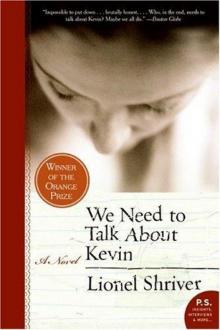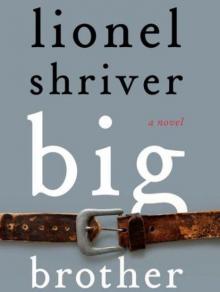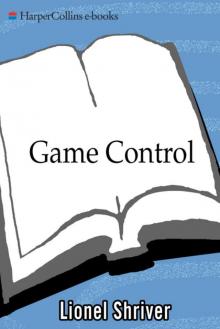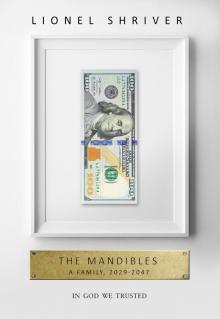- Home
- Lionel Shriver
Big Brother Page 25
Big Brother Read online
Page 25
chapter seven
This time, I had not been invited to Java Joint. I had been summoned.
We arrived at the same time. Discarding my jacket, I paused the smallest moment before sliding into the booth, my version of a show-off twirl. In the six weeks since Fletcher and I had last seen each other I’d dropped another twelve pounds before leveling off; this was Fletcher’s first viewing of the finished product. What’s more, my tastes in dress had grown racier, at least for me: tight black jeans, a low-cut aqua blouse. My new contours in the mirror having proved such a private letdown made this single serious payoff—my husband’s admiration—only more important.
As he furtively checked me out, I caught a look in my husband’s eye that I hadn’t seen in a long time. Yet my figure both aroused and annoyed him. “New clothes, I see.”
“The old ones don’t fit.”
“You’re looking . . .”
I waited. I had earned this. It was my reward.
“You’re looking a little fragile.”
“Thanks.” I couldn’t believe he could be so ungenerous. Obviously he wanted to be the thin one. The fit one. The perfect person, who required a fallible slob at his side for contrast.
Fletcher backed off any more criticism, but the compliments I had anticipated were not forthcoming. “Never mind for now. We have to talk about Tanner.”
“All right. Shoot.” I hated sounding so clipped, but he’d hurt my feelings.
“He’s quit school.”
“That’s ridiculous. He’s two months from graduating.”
“It’s deliberate. He thinks he’s exceptional. As far as Tanner’s concerned, he’s getting out in the nick of time, just before he becomes a plain old high school graduate like everyone else.”
“This country is awash in dropouts.”
“I’ve said that. But he also wants to spite me, and in that sense the ploy is working to plan.”
“What can I get you folks?”
Fletcher had learned not to order a muffin. “Green tea, decaffeinated, no sugar,” said Fletcher, and I chimed in, “Make that two.” A draw.
“There’s more,” said Fletcher. “Two days ago, while I was in the basement working on a rush commission, Tanner packed up and left. No note. His computer’s gone, all his favorite T-shirts. He even left his cell behind so I couldn’t contact or track him. None of his friends have heard from him. I’ve been so desperate, I even contacted Cleo. No intel, except I did find out she’s become a born-again, believe it or not.”
“Predictable,” I said. “Another addiction. So where do you think he went?”
“Where else? California. Just like your fat-headed dad. Tanner flunked American History—along with everything else. So the only history he has absorbed is your family’s. Before he left he even started calling himself ‘Tanner Appaloosa.’ Feuerbach, I’ve been informed, ‘isn’t commercial.’ ”
“Does he have any money?”
“He’ll have cleaned out his meager savings account. And my wallet.”
“I’m so sorry.” But I wasn’t close enough to this story. I was “so sorry,” as if I were comforting a neighbor or employee.
“There’s more than his diploma at stake here. I want a son who works. Who doesn’t loll around waiting for an inheritance or some other manna from the sky. Who understands that life isn’t just something you’re given but something you make. But kids, they’re told in school now that they’re God’s little angels, that they’re wonderful just because they exist, and they buy it. So they walk out into the world and expect everyone to bow down. It’s dangerous, Pandora. The ‘I’m Mr. Wonderful’ thing, it makes them stupid and it makes them prey.” Fletcher was starting to choke up, but there was fury in there, too, and it was directed at me.
“We see completely eye-to-eye on our son, so I don’t understand why you keep acting as if we’re having an argument.”
“He didn’t just get this stuff from Facebook or Keeping Up with the Kardashians or his teachers. It’s you, and your brother. You two make fun of Travis, but only as an opportunity to remind everybody: Our dad was a TV star. That’s the inheritance that Tanner’s waiting for, and it’s worse than waiting for money. Though after those magazine covers about your company, he figures you’ll throw him a wad sooner or later.”
“I’ve never dangled any pot of gold at the end of his rainbow. I’ve never glorified growing up as an ‘Appaloosa,’ either. Don’t I go by Halfdanarson? In fact, I’ve bent over backwards with those kids, explaining that any celebrity I either cadged or earned was no big deal, or even a downer.”
“They don’t believe you.”
I saw his point. You could never convince powerless, obscure people—like children—that they were better off powerless and obscure. It sounded suspicious, like the ruling class shoring up its advantage. For years Travis had tried to convince us kids that we wouldn’t like “slimy” avocados, because he wanted all the ripe ones for himself.
I said, “I’m not getting how you expect me to help here.”
“I want my kids to turn out solid.” Atypically, Fletcher wasn’t interested in practicalities. “I don’t want them thinking there’s some cheap shortcut. I want the kind of kids nobody has anymore. Who bear down, who do their part, who don’t expect a leg up or a handout. And now your brother has poured all this crap in their ears. About honoring your ‘talent’ and how he’s whizzed around the world unburdened by anything so clay-footed as a high school diploma, much less a college one. Where do you think Tanner got the idea of dropping out? Your fat fuck of a brother quit school at seventeen, too.”
“Edison makes a better role model for our kids right now than either one of us. He’s not taking any ‘shortcuts.’ He didn’t opt for stomach banding or liposuction. He’s skipping one meal after another, for months, and that’s exactly the kind of hard work and humility you’re touting.”
“That’s a stretch. Do something unbelievably stupid like put on hundreds of pounds and then undo it. That’s hardly a model of constructive behavior. Like carrying a load of bricks to one side of the yard and then carrying them back again.”
“Cody, whether you like it or not, is bowled over.”
“Cody has the flu, and doesn’t have a mother to take care of her. Which I thought I’d gotten for her seven years ago, but apparently not. Instead, all I seem to have installed in our house—for a little while—was some deadbeat’s sister.”
I drained my tea. This was pointless. We’d gone around this loop continually: You’ve betrayed us, your real loyalty should be to your family, why is your brother so important, I’m only doing this for a short while and I’ll be back but Edison needs me. Why further groove a broken record?
So I promised I’d let him know if Tanner got in touch, and noted that without a word from the boy himself there was nothing we could do. This meeting failed to accomplish anything tangible, but Fletcher hadn’t come to me for a clue to our wayward son’s whereabouts. He’d dragged me to that coffee shop to have someone to blame. And on some level, I wasn’t sure he was wrong.
When you’re seventeen, it’s not called ‘running away,’ ” said Edison while washing lettuce. “It’s called ‘leaving home.’ That’s what the cops would tell you, too. Tan’s not a missing person. He’s a left person. With a dad like that, it’s a wonder he didn’t cut out years ago.”
“He’s a young seventeen, and Fletcher’s right,” I said. “As soon as he runs out of money, that kid is ripe for any passing deviant.”
“He’ll clue-up pronto. My money says in no time some slightly older fox takes him under her wing and pays for everything.”
“But he has no understanding of how hard—”
“It’s not your job”—Edison poked a wet finger at my chest—“to be pre-disappointed for him, dig? You and Feltch go on and on about how big and terrible ‘the world’ is.
Well, maybe so. But in that case, it’s the world’s job to be big and terrible, not yours. You guys keep drilling into the kid he’s not going to make it, he doesn’t have a prayer. He has to be ‘realistic.’ You think you’re protecting him. But you’re insulting him. Take my word for it, that’s the way Tan sees it: you’re keeping a foot on his neck.”
“It is protecting him, to at least ensure he graduates from high school.”
“What for? In Tanner’s terms? Besides, you may be all maternal on the guy’s ass, and maybe you do think you have his interests at heart, but Feltch, man—Feltch just wants those kids to do what he says. He’s an unforgiving authoritarian hard-ass, and it beats me what you ever saw in the guy.”
I was less alarmed by Edison’s characterization than by his final choice of verb tense. “Fletcher Feuerbach is honest, loyal, diligent, and, whether you personally can see it, kind.”
“Kind! About time you noticed Tanner and Cody aren’t the only ones that cat wants to control.”
“He hasn’t controlled me. He didn’t want me to move in with you, and I did.”
“Has he made it easy? Has he been supportive? Of a project you warned me yourself would be the hardest gig of our lives?”
I didn’t bother to answer.
“All right, then.” Edison brought a cleaver down on a chicken leg. “Case closed.”
Ehhh-di-SUN!” Cody gave my brother a high five. She’d dropped the “Uncle” for months, preferring the chantlike emphasis with which impatient crowds demand the appearance of rock stars. She propped her once-neglected bike against our own in the hall, since it had become evident, once Edison and I started cycling too, that her father hadn’t personally annexed this efficient form of transport. She was looking a little peaked, and I recognized the mopy, lethargic symptoms as an ailment I’d come down with at the same age.
“If anyone asks”—she clumped her backpack on the kitchen pass-through—“I wasn’t here. I told Dad I was working on a paper with Hazel and eating with her folks.”
“You shouldn’t lie,” I said.
“Mom, it’s not worth it. Dad gets so bent out of shape when he knows I’m coming here. He calls it ‘the clubhouse.’ He goes all quiet and moves around all jerky and stiff . . .” She did a demonstration, a cross between Charlie Chaplin and Frankenstein’s monster, and we laughed.
“You could always invite your dad to come, too,” I said.
“The only way Dad’s coming to Prague Porches is with a gallon of gas and a match. Like, head for the exits, man.” His daughter’s recent penchant for man and jive and crib must have driven Fletcher insane. “And now with Tanner gone it’s worse. Dad makes me feel like a traitor. And I hate leaving him by himself. With that gucky brown rice and broccoli so undercooked it’s like chewing on a tree. It’s totally depressing.”
“Yo, it ain’t your fault the cat can’t cook,” said Edison, tailing ten green beans at a stroke. We were having cod fillets with an olive, caper, and eggplant tapenade, one of my brother’s specialties. I’d no idea how he did it without tasting anything.
Cody bombed into a recliner. “I can’t tell you the relief of plopping in a chair that isn’t some sort of artwork. Dad’s stuff isn’t, like, totally uncomfortable or anything, but soon as you sit in one of those things he starts staring all beady-eyed and shit, making sure you don’t put a wet glass on the arm or scuff your shoes on the wood. So just sitting there I get an anxiety attack. Half the time I can’t stand it and just sit on the floor, dig?”
“Tell me about it,” said Edison, pulling a charred whole eggplant from the oven.
“He finally fixed the Boomerang, you know,” said Cody.
“Let’s hear it for superglue,” said Edison.
“Not exactly,” said Cody. “But I don’t know why he bothered. I guess the chair darkened over the years, so the new wood isn’t the same color. He keeps running his hand over the rail and scowling, or picking at some little joint where the pieces don’t meet absolutely, one hundred percent, exactamundo flush.”
“You know your dad’s a perfectionist,” I said, setting the table. What I’d missed most during my Upchuck days wasn’t food but the event of food, all the surrounding activities like putting groceries in cupboards and folding napkins. I now adored setting the table.
“Supposedly that’s a compliment,” said Cody. “But what’s so great about being a perfectionist? You’re never happy. You do all this work, and then the stuff you’ve made just pisses you off.” Since her regular lessons with Edison, Cody had grown more blasé, tougher-seeming, but she hadn’t changed that much, and caught herself. “Anyway, the main thing is the Boomerang’s okay, right, Edison? It’s back. You didn’t, like, mess it up. Or, you know, whoever messed it up—didn’t.”
This was a perfect opportunity for Edison to admit responsibility once and for all, but Cody wasn’t the only one who hadn’t changed that much.
“The times you have told your dad you’re coming here,” I said, “what have you told him when you came back? About what it was like?”
She looked away. “I don’t know. I guess I say it’s depressing.”
“Which is exactly the way you described what it’s like at home.”
“Well, I don’t think it is depressing. Here, I mean. You know I have a pretty cool time. My improvisation’s getting better, and we play Fictionary when Oliver’s over—”
“Do you tell your dad when Oliver’s come over?”
“Um,” she said glumly. “Generally, no, I guess I don’t.”
“And do you tell your dad that we play Boggle, and Monopoly, and go for walks? About dividing up the parts and reading aloud Tennessee Williams plays, and practicing our hicky Southern accents? Or how we built that snowman out back in February—the really massive one that we made to look like Edison before he went on his diet, using some of his old clothes that no longer fit? That was hilarious.”
Edison shouted from the kitchen, “Even in Iowa, thought we was gonna run out of snow!”
“Of course I don’t!” said Cody impatiently. “I tell him we just sit around and watch TV. That’s what he wants to hear, so that’s what he’s going to hear, know what I’m sayin’?”
“Yes, I know what you’re sayin’,” I said. “But you shouldn’t have to cover up having a good time here, and you shouldn’t think you have to tell us that your dad is miserable, either. It’s not fair to you.”
“Who said anything about fair? I’m just trying to get by. Nuts, it’s just like that stupid program Grampa was in. Those kids never told the truth—to either one of their parents. Which is, anyway, like, big surprise, since kids don’t tell the truth to their parents even when they’re together.”
“Fletcher and I are together,” I corrected sharply.
“Yeah, right.”
As we sat down to eat, I recounted an early episode of “that stupid program” in which Caleb, Maple, and Teensy all collude to portray their mother’s life as desolate to their father, and their father’s life as desolate to their mother, while in truth both divorced parents are living the life of Riley. Driven by mutual pity, the parents meet up and compare notes, although only after conducting a comical conversation in which each utterly misapprehends the other’s state of mind.
Edison waited table, wearing a chef’s apron whose tie could now reach all the way around his back and then knot in the front—a feat he had only achieved the previous week. The fish was garnished with rosemary sprigs, our whole-wheat couscous dotted with roasted hazelnuts and slivers of dried apricot.
“So, do you miss your brother?” I asked Cody. It was what no one had asked me back in the day.
“Yeah,” she said warily.
“And . . . have you been in contact?”
She tried to get by with a shrug.
“The kid’s not going to rat out her own brother,” said Edison, havin
g a seat with his Upchuck and a straw; chocolate malt, I determined.
“I’m not asking her to rat. It would be comforting to know if Tanner’s all right.”
“I got a hunch,” she said, “he’s all right.”
“When Edison absconded to New York at the same age,” I said, “I was under a lot of pressure to tell our father where he’d gone.”
“Though Travis didn’t want to track me down out of concern,” said Edison. “He wanted confirmation I’d landed facedown in a puddle. Feltch isn’t any different, either.”
“And did you tell?” Cody asked me.
I considered fibbing. If Cody blabbed, my locating Tanner’s hideout would win me a few grudging points with Fletcher. “I said I’d no idea where he was and he hadn’t told me anything before leaving and he hadn’t contacted me, either.”
“I have no idea where Tanner is,” Cody recited, “he didn’t tell me anything, and he hasn’t contacted me, either.”
“Whoa, that’s the kind of little sister I can dig!” said Edison.
“Yes, we’re all alike,” I said. “We cover for you, we lie for you, we take the heat for you. We clean up your messes and mollify our parents for you. We never fail to come across with undying adoration whether or not you deserve it, and we can’t take our own lives nearly as seriously as we do yours. We snuffle up the crumbs from your table on the rare occasions you notice we’re alive.”
Edison gestured at our dinner. “But, hey, not bad crumbs!” My characterization pleased him.
The landline rang. I picked up.
“Panda-monium! Your brother still laying off the Fritos?”
“He hasn’t looked at a Frito in five months,” I said. “You could hardly call him chubby. He looks great, his spirits are high, and he exercises every day. He practices the piano nonstop, and he’s got his chops back.” I hadn’t changed, either. I was still the founding patron of the Edison Appaloosa Defense Fund.
“Isn’t that swell,” said Travis, as usual overwhelmed with joy on hearing glad tidings of his only son. “But answer me this: a sad-sack, henpecked high school chemistry teacher riddled with cancer suddenly becomes a big-time drug dealer. How plausible is a premise like that? This ‘Walter White’ bozo is a timid, scaredy-cat loser, and I don’t buy it. That shit won’t see a second season.”

 Ordinary Decent Criminals
Ordinary Decent Criminals The Female of the Species
The Female of the Species We Need to Talk About Kevin
We Need to Talk About Kevin A Perfectly Good Family
A Perfectly Good Family So Much for That
So Much for That Checker and the Derailleurs
Checker and the Derailleurs The New Republic
The New Republic Double Fault
Double Fault Should We Stay or Should We Go
Should We Stay or Should We Go The Post-Birthday World
The Post-Birthday World Big Brother
Big Brother Game Control
Game Control The Mandibles
The Mandibles The Standing Chandelier
The Standing Chandelier Property
Property So Much for That: A Novel
So Much for That: A Novel